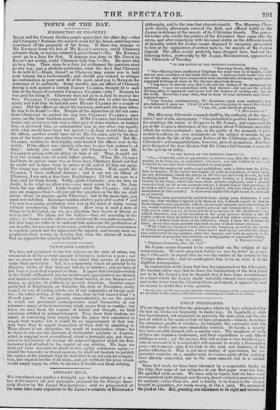JURISDICTION OF CHANCERY.
TOPICS OF THE DAY.
KEAN and the Covent Garden people quarrelled the other day—what (lid Chancery.? Forbade the actor to work fornhis bread, until they were convinced of the propriety of his living. If there was damage to Mr. KEMBLE from the loss of Mr. KEAN'S services, could Chancery estimate them, or having estimated, grant them ?—No. Mr. ICEMBLE must go to a Jury for that. If damage was done to Mr. PlucE by KEAN's not acting, could Chancery help him ?—No. He must also go to a Jury. Then, since to a Jury for settlement the question must go any way, says a choleric gentleman, what the devil had Chancery to do with it ?—Hush, friend ! or Chancery may enjoin you to hold your tongue for a twelvemonth ; and . should you venture to whisper an exclamation in your next fit of the gout, send you to Newgate for contempt of its authority. Some months ago, an officer of Chancery having a writ against a certain HENRY CLARKE, thought fit to seek him in the house of a certain CHARLES CLARKE—why? Because he was paid for doing it. Chancery does not go to a Jury to recover her fees. CHARLES CLARKE enjoined the officer not to enter his house again, and told him he had not seen HENRY CLARKE for a couple of years. Did the officer go about his business, and seek his man where he was to be found ?—No. Despite of the injunction (it did not come from Chancery) he pushed his way into CHARLES CLARKE'S once more, on the same bootless errand. If Mr. CLARKE had knocked his brains out, or thrOwn him over a three pair of stairs window, or burked him, or doctored him, or extinguished him in any other way equally civil, what would have been the upshot ?—A Jury would have sat on the officer, another would have sat on Mr. CLARKE, and by the deci- sion of the twelve men the matter would have been settled. But Mr. CLARKE, wishing to deal legally, only handed the officer over to the watch. If the officer was injured, who was to give him redress ?—A Jury ; nobody else could. What did Chancery ?—It sent Mr. CLARKE to prison without sitting on him at all. True, it could not heal the wound, but—it could inflict another. When Mr. CLARKE had been in prison some two or three days, Chancery found out that he ought not to have been in prison at all, and it let him out again. The wrong was admitted by the act of liberation. Well, quoth Mr. CLARKE, I have suffered damage ; but I am not an officer of Chancery, I am only a free-born Englishman ; I'll tell my case to a Jury, and let them decide. Softly, quoth Chancery ; you are free, no doubt, to do what we allow you,—you must come to us. No Jury trials for our officers! Come to you! cried Mr. CLARKE; will you give the damages then P—If you put the question on the file, we shall advise about an answer, quoth Chancery ; but in the mean time, you must rest satisfied. Quousque tandem abutere patientia nostril said CICERO to a young gentleman who was in the habit of doing wrong without recompense, like Chancery. How long is such a state of things to be tolerated, say we, in a kingdom that boasts of liberty as well as law? We blame not the Judges—they act according to the rules ; we blame not the officer—we doubt not he was quite as regular; but how long are rules to be suffered that authorize the profanation of our hearths, for any cause or no cause, and that, when such wantonness is repelled, punish not the injurer but the injured, and having done so, perpetuate their wrong by denying him even the chance of redress that an appeal to his country holds forth?


















 Previous page
Previous page